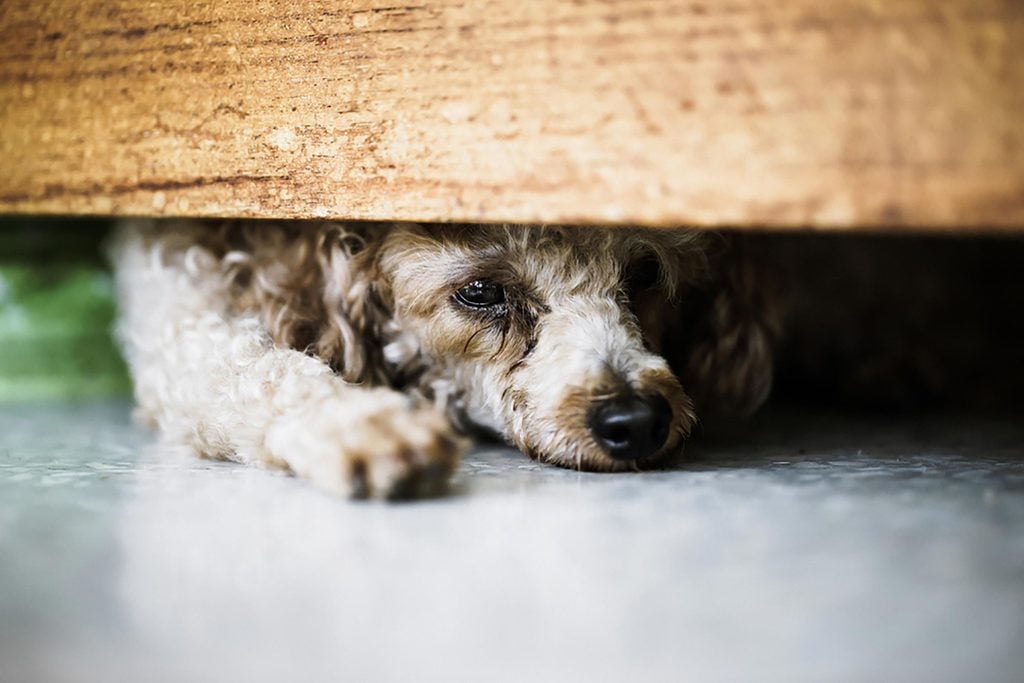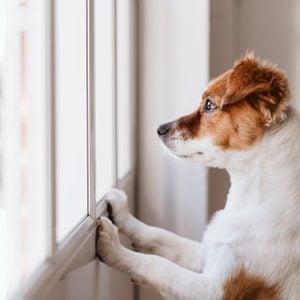Why Do Dogs Freak Out During Thunderstorms?
Updated: Jul. 03, 2023

If your dog sprints to hide under your bed the second they hear a rumble of thunder in the distance, you're going to want to read this.
The air feels heavy and humid. The sky grows dark. By the time you hear the first crash of thunder, you realize that not only is your afternoon golf game canceled, but your dog is freaking out. Again. What gives? Well, we found out—and the reasons might surprise you.
By the time you feel the first drop of rain, Rover’s already pacing, his tail down, and if Rover’s a talkative breed (like my dog, Lewis the Beagle), he’s probably doing his famous high-pitched whine. Here’s how you can help calm your anxious dog (without medication).
As the rain starts to pound on the windows, you may find Rover hiding under a low piece of furniture, like a bed or a sofa, or perhaps in the basement. Holistic pet therapist and author Sally Morgan tells Reader’s Digest it’s not unusual for a dog in the throes of a thunderstorm freak-out to attempt to become grounded—literally and figuratively—by seeking the lowest place in the house or someplace adjacent to the house’s plumbing.
But why? As you might suspect, noise is a reason, but it’s only part of the equation. “Thunderstorms can be a trigger for dogs with noise phobia,” says Kelly Ryan, DVM, Director of Veterinary Services at the Humane Society of Missouri’s Animal Medical Center of Mid-America. “It is an irrational, intense fear of a noise or sound that poses no real threat. If your dog has a noise phobia, you will probably see it with other loud noises, such as fireworks.” Here’s why dogs are scared of fireworks.
Noise phobias can start at any age and worsen over time if left untreated. Morgan suspects that the phobia may stem from a dog’s innate survival-based need to hear what’s going on in its immediate vicinity. Not only do loud sounds interfere with that, but they also confuse the dog into believing that something of flight/flight proportions is happening.
Here are the other factors that may be causing your pooch to freak out:
-
- Static electricity. During a thunderstorm, static electricity in the clouds builds up, eventually bursting into lightning. Dogs can sense this static electricity, even from inside our homes, and often even before the storm reaches our own neighborhood, says Lazhar Ichir, Founder of Breeding Business, an educational platform for ethical dog breeders. “Specialists now understand that static electricity is felt by dogs through their fur, generating an unpleasant tingling sensation,” he says. “For this reason, pets feel agitated and seek a spot they hope might isolate them from the static charges.”
- Change in barometric pressure. Dogs with thunderstorm phobias can often sense a drop in barometric pressure that accompanies these storms, says Wendy Hauser, DVM, an on-staff veterinarian and VP of Veterinary Relations for ASPCA Pet Health Insurance.
- Change in ions. During a thunderstorm, the ions in the atmosphere change. “Dogs may experience that as increased vigilance as external signals travel through their nervous system more quickly. These signals include the sounds of rain and thunder, and flashing lights,” explains Morgan, and this explains why the dog goes in search of a way to ground himself.
- Change in our behavior. “Dogs are sensitive to their people’s reactions to the environment,” Morgan points out. “If [you’re] running around the house to close windows, complaining when the power goes out, etc., your dog is going to feel that something is wrong and that he needs to be on alert.”
- Genetics. According to a study, dogs—just like humans—can have noise sensitivities passed down to them through genetics. Dogs can have hereditary reactions to “certain frequencies, intensities or types of sound, associated with strong feelings of dislike, fear or even aggression.” Different dog breeds can have different levels of anxiety during storms, and the breeds who seemed the most anxious were working and sporting breeds, such as German Shepherds and Collies, which would make sense considering that they were bred to take care of other animals, which includes shepherding them out of nasty weather.
How to ease your dog’s anxieties in a thunderstorm
In addition to keeping our own anxiety in check, it could be helpful to gently lead Rover to the bathroom and into the bathtub, suggests Patra de Silva, President of NHV Natural Pet Products, makers of herbal and plant-based supplements that are veterinarian approved. As Morgan pointed out, this is one place that your dog might like to be during a storm. As de Silva explains, the porcelain may actually help block static electricity. At the same time, try not to give him too much positive reinforcement for his freak-out. Although it’s a natural human response to pet your best friend and tell him it’s going to be okay, he may perceive that you’re telling him his freaking out is something you’d like to see him do again.
Another place your dog may prefer to be during a storm is in a dark, quiet room, with quiet calming music, says Dr. Ryan. If your dog is trained to sleep in a crate, you can try encouraging him to go there.
Dr. Ryan also recommends trying body compression options such as the ThunderShirt. The ThunderShirt is a jacket with adjustable fasteners that fits dogs of most sizes. It is made from durable and washable fabric that compresses much like Spandex does for humans, and it seems to provide comfort to some dogs. Read about one dog owner’s experience with the ThunderShirt that helped ease her dog’s anxiety.
Sarah Nold, DVM, on the staff of Trupanion, a pet insurance company, suggests closing the window blinds or curtains and leaving a light on to minimize flashes of light from the storm. Some dogs will do best with anti-anxiety medication, she says, and Dr. Ryan agrees. But these are prescription meds that you must obtain from your veterinarian after discussing the treatment options that will be best for your dog. Or try a natural supplement, like Adaptil. “Pheromone products can be great options for some dogs,” Dr. Ryan says. Essential oils may be of some help as well; same with herbal dog collars.
Just remember, reminds Jonathan Leshanski, DVM at Home Veterinary: Your dog does not choose to be scared of thunderstorms, and you need to understand that this fear is not a failure in your dog, but something that doesn’t make sense to them. You have fears yourself! Now, learn about the signs that you dog wants some alone time.



